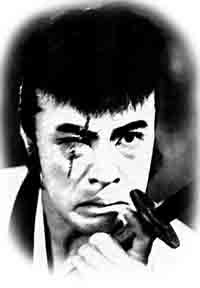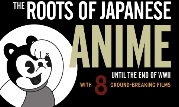I should stress that I don't necessarily think that internet is causing this: it's just something I have heard said many times. As I state below, I think there are a lot of other factors involved in the crisis of film criticism beyond just the introduction of new media technologies (I am always suspicious of explanations through technological determinism). But I think the internet has been a convenient scapegoat for many in Japan who are extremely frustrated by what is perceived as the death of film criticism. When the magazines are dying out, or like Kinema Junpo, just turning into industry rags, the opportunities for paid film writing are decreasing. This is a life and death matter for many. The internet has not stepped in, because while there are some good blogs or individually run sites like boid, none can help sustain film criticism as a career. The industry run sites have basically excluded professional film criticism. So when people look at the most popular movie sites, and see just viewer reviews, the opinion is created that such sites are not just another form of criticism, but are in fact replacing real film criticism. The cause-effect relationship may be dubious, and fueled by prejudice against new media that in the general culture are seen as undermining literacy in general, but such connections are made in desperate circumstances.
I really do think the Japanese case is different, but I would bet that it is not the only country or region to be experiencing these problems. It would be nice to think that all these different possibilities can exist at the same time as one finds in the USA and the UK, each satisfying a particular niche, but that in general is a luxury that I would bet is not as common as we think. The economics and politics do not support it.
There are a lot of reasons why all is not rosy for criticism in Japan, many of which go beyond the issue of new media technologies. First, while Japan has a long and very vibrant history of film criticism, one that was supported for a time by a productive publishing industry, film criticism, for better of for worse, was never intimately integrated into the film industry. True, film critics became scriptwriters or worked as publicity men, and film directors wrote film criticism, but film criticism never developed into an industry that was important to the film studios. While in the US, ads make a point of quoting famous critics in order to get an audience, that rarely if ever happens in Japan (they usually quote some tarento or some anonymous viewer--a form of "reviewing" that echoes these internet blog or review sites). Newspaper film criticism never developed to the point that critics became influential figures (except in the old days like with Tsumura Hideo). There is no site like Rotten Tomatoes to guide viewers to film criticism and Yahoo Japan, unlike Yahoo USA, does not link to film reviews from its movie pages. Famous critics like Yodogawa Nagaharu or Komori Kazuko who hosted Saturday-night-at-the-movies kind of shows helped TV stations broadcast second rate movies, but that position by definition did not allow for bad reviews (whereas Siskel and Ebert's fame depended on them giving bad reviews). During the down years in the 1980s and 1990s, critics like Yamane Sadao and Hasumi Shigehiko did help a lot of independent films, but in that case film criticism remained as fringe as the independents. Now that the industry has "revived," there is absolutely no sense in the industry that film criticism is important except as publicity. And thus today's film companies can quite blatantly kick film critics out of preview screenings if they write one bad review. And thus new magazines like Nihon eiga magazine contain not one sentence of film criticism. I reiterate this: in Japan, there is increasingly no real niche for good film criticism--it is dying away and the internet has not filled in the gap.
Why has this happened? One can probably go back and look at the history of criticism (art, theater, etc.) in Japan to try to find patterns, but I think part of the reason is the long-held view, by officials and cultural elites, that cinema is mass-produced trash or socially dangerous. Writing about film, therefore, was not considered respectable. That led, on the one hand, to the failure of film studies to develop in Japan as an academic discipline. And without film studies in universities around the country, with lots of students and scholars buying books and journals, an academic film publishing industry failed to develop. But I think, on the other hand, that there also failed to develop a culture in which it was important - be it on the thumbs up thumbs down or on the intellectual-philosophical variety - to evaluate films. One difference between the US and Japan is that Japan, like France, did not develop a strict division of labor in writing on film, which meant that any intellectual could write on film, just as film critics could write top theoretical work (in the US, we rarely imagine newspaper or magazine film critics becoming intellectual film scholars). But in France, this phenomenon was bolstered by a larger cultural valuation of cinema; in Japan, it was not.
Is the internet the cause of the recent decline in film criticism in Japan? No, but as you can see with the use of tarento quotes in film ads, the industry is much more amenable to that kind of internet-like reviewing than with independent film critics. One reason is because it is often anonymous and can easily be manipulated: just as my wife once saw a distribution company employee posing as an average viewer in the Pia exit poll, you can use a dozen employees using various accounts to start padding the Yahoo viewer reviews. Film is becoming part of the contents industry, now increasingly centered in new media, but film criticism in Japan, for better or for worse, is not part of the contents industry like it is in the US. It simply does not exist in this burgeoning industry - if it does, it is only in so far as it functions purely as publicity.
Are there alternatives? Of course, but the economics and in some ways the culture does not readily support it. Anyone can create a blog or their own site, but right now no individual in Japan can support themselves doing that. A few of the bloggers are getting notice enough that the independent distributors are sending them preview cards, but they are still minority sites. Look at sites like boid and you will see a common pattern: great ambitions at the start running into the reality of little money and few willing to volunteer their time for long. Some paper-based publications like Eiga geijutsu are adding internet-only articles on their sites, but no big publishers are initiating projects centered on criticism (the only significant criticism magazine to appear of late is nobody, created by students at my old university, Yokohama National University, but it is mostly focused on European film). Film studies is still in a very weak position in academia and, while there were experiments like Kato Mikiro's now mostly self-serving CineMagaziNet!, not much serious publishing is not going on on the internet or in print.
I also think this is an issue related to government. I wrote about this in Midnight Eye and Eiga geijutsu, but frankly, the government conception of cinema culture and the contents industry does not include film criticism or film academia. Cinema is an industry, and since film criticism is not an industry, it does not belong in the future vision. I think this can be said of the internet as well.
Mark Roberts wrote that venues for publication and the production of criticism are related, such that if there is good criticism out there, good places to publish that will appear. I believe that is ideally the case, but it just has not happened often in Japan. There are lots of great pieces written in Japanese on film theory, history or criticism in Japan that are not finding places to publish. (For instance, Makino Mamoru's IMMENSELY IMPORTANT early Showa periodical index - the follow-up to the index for Meiji and Taisho periodicals - is still not getting published, probably because the previous one didn't sell well enough.) American academic publishing, like American academia, is extremely privileged economically and cannot serve as an example for most other countries. While serious film journals in the USA are not making a lot of money, they have a definite market. Even if they get institutional support, that is on the basis of an academic culture that values film studies. Neither that market nor that culture exists in Japan to a sufficient degree and thus those journals or publications do not exist much in Japan.
I would agree that blaming the internet is simplistic and I hope I've pointed to many other factors. What I worry about, however, is that given how the internet is being historically articulated in Japan today - especially how the media industry is defining it - it will not serve anytime soon as a productive venue for influential film criticism. It may not be the reason film criticism is dying, but I wonder whether it is being defined in ways that prevent the revival of film criticism or the creation of new forms of film criticism. I hope my fears are wrong, however.


